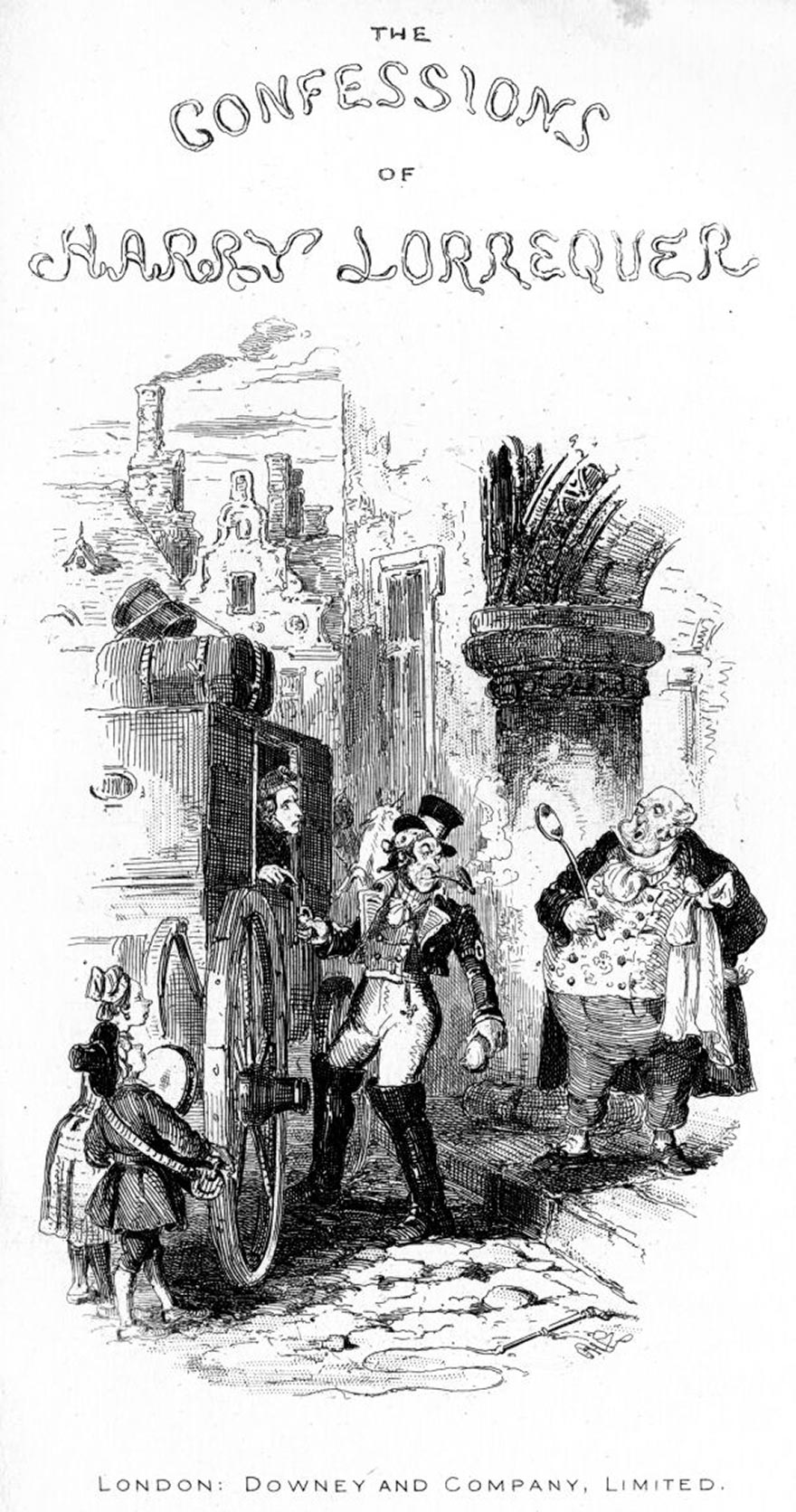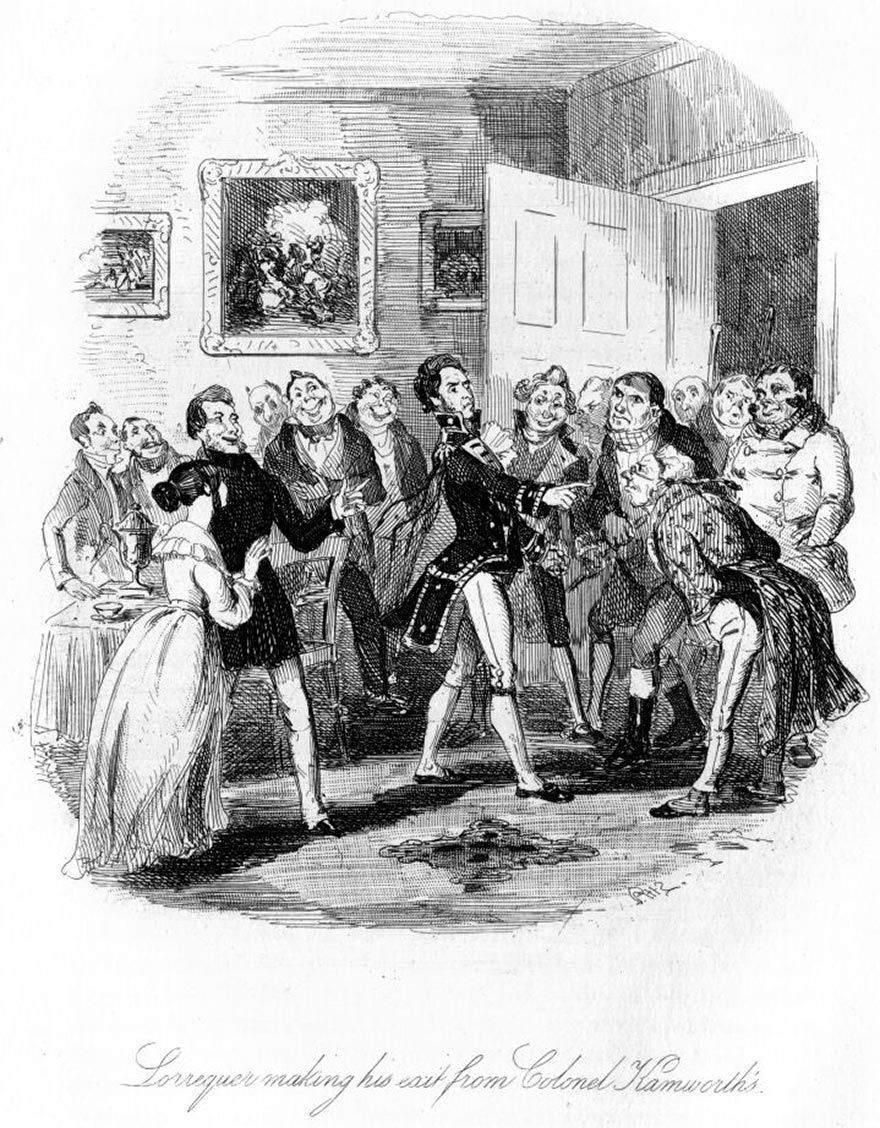[By Charles James Lever (1806-1872)]
Dublin
MDCCCXXXIX.
Though the title page has no author’s name inscribed, this work is generally attributed to Charles James Lever. Harry Lorrequer was a young officer in a British regiment stationed in Ireland in the early 1800’s. The 1839 First Edition had pages too stained and friable for scanning—so a colleague, Mary Munarin, helped prepare this eBook for Project Gutenberg in the old fashioned way—she typed it! This story will be a delight to any readers with a few drops of Irish blood (or a wee drop of the Old Bushmills) in their veins.

A crowd is a mob, if composed even of bishops
And some did pray—who never prayed before
Annoyance of her vulgar loquacity
Enjoy the name without the gain
Enough is as good as a feast
Fighting like devils for conciliation
Has but one fault, but that fault is a grand one
Hating each other for the love of God
He was very much disguised in drink
How ingenious is self-deception
My English proves me Irish
Mistaking zeal for inclination
Mistaking your abstraction for attention
Rather a dabbler in the “ologies”
The tone of assumed compassion
That “to stand was to fall,”
That land of punch, priests, and potatoes
What will not habit accomplish
“We talked of pipe-clay regulation caps—
Long twenty-fours—short culverins and mortars—
Condemn’d the ‘Horse Guards’ for a set of raps,
And cursed our fate at being in such quarters.
Some smoked, some sighed, and some were heard to snore;
Some wished themselves five fathoms ‘neat the Solway;
And some did pray—who never prayed before—
That they might get the ‘route’ for Cork or Galway.”

FAVORITE QUOTATIONS
A c’est egal, mam’selle, they don’t mind these things in France
A rather unlady-like fondness for snuff
A crowd is a mob, if composed even of bishops
Accept of benefits with a tone of dissatisfaction
Accustomed to the slowness and the uncertainty of the law
Air of one who seeks to consume than enjoy his time
Always a pleasure felt in the misfortunes of even our best friend
Amount of children which is algebraically expressed by an X
And some did pray—who never prayed before
Annoyance of her vulgar loquacity
Brought a punishment far exceeding the merits of the case
Chateaux en Espagne
Chew over the cud of his misfortune
Daily association sustains the interest of the veriest trifles
Dear, dirty Dublin—Io te salute
Delectable modes of getting over the ground through life
Devilish hot work, this, said the colonel
Disputing “one brandy too much” in his bill
Empty, valueless, heartless flirtation
Ending—I never yet met the man who could tell when it ended
Enjoy the name without the gain
Enough is as good as a feast
Escaped shot and shell to fall less gloriously beneath champagne
Every misfortune has an end at last
Exclaimed with Othello himself, “Chaos was come again;”
Fearful of a self-deception where so much was at stake
Fighting like devils for conciliation
Finish in sorrow what you have begun in folly
Gardez vous des femmes, and more especially if they be Irish
Green silk, “a little off the grass, and on the bottle”
Had a most remarkable talent for selecting a son-in-law
Had to hear the “proud man’s contumely”
Half pleased and whole frightened with the labour before him
Has but one fault, but that fault is a grand one
Hating each other for the love of God
He first butthers them up, and then slithers them down
He was very much disguised in drink
How ingenious is self-deception
If such be a sin, “then heaven help the wicked”
Indifferent to the many rebuffs she momentarily encountered
Involuntary satisfaction at some apparent obstacle to my path
Jaunting-cars, with three on a side and “one in the well”
Least important functionaries took the greatest airs upon them
Levelling character of a taste for play
Listen to reason, as they would call it in Ireland
Memory of them when hallowed by time or distance
Might almost excite compassion even in an enemy
Misfortune will find you out, if ye were hid in a tay chest
Mistaking zeal for inclination
Mistaking your abstraction for attention
My English proves me Irish
My French always shows me to be English
Never able to restrain myself from a propensity to make love
Nine-inside leathern “conveniency,” bumping ten miles an hour
No equanimity like his who acts as your second in a duel
Nothing seemed extravagant to hopes so well founded
Nothing ever makes a man so agreeable as the belief that he is
Now, young ladies, come along, and learn something, if you can
Oh, the distance is nothing, but it is the pace that kills
Opportunely been so overpowered as to fall senseless
Other bottle of claret that lies beyond the frontier of prudence
Packed jury of her relatives, who rarely recommend you to mercy
Pleased are we ever to paint the past according to our own fancy
Profoundly and learnedly engaged in discussing medicine
Profuse in his legends of his own doings in love and war
Rather better than people with better coats on them
Rather a dabbler in the “ologies”
Recovered as much of their senses as the wine had left them
Respectable heir-loom of infirmity
Seems ever to accompany dullness a sustaining power of vanity
Sixteenthly, like a Presbyterian minister’s sermon
Stoicism which preludes sending your friend out of the world
Strong opinions against tobacco within doors
Suppose I have laughed at better men than ever he was
Sure if he did, doesn’t he take it out o’ me in the corns?
That vanity which wine inspires
That “to stand was to fall,”
That land of punch, priests, and potatoes
The divil a bit better she was nor a pronoun
The tone of assumed compassion
The “fat, fair, and forty” category
There are unhappily impracticable people in the world
There is no infatuation like the taste for flirtation
They were so perfectly contented with their self-deception
Time, that ‘pregnant old gentleman,’ will disclose all
Unwashed hands, and a heavy gold ring upon his thumb
Vagabond if Providence had not made me a justice of the peace
We pass a considerable portion of our lives in a mimic warfare
What will not habit accomplish
What we wish, we readily believe
When you pretended to be pleased, unluckily, I believed you
Whenever he was sober his poverty disgusted him
Whiskey, the appropriate liquor in all treaties of this nature
Whose paraphrase of the book of Job was refused
Wretched, gloomy-looking picture of woe-begone poverty
